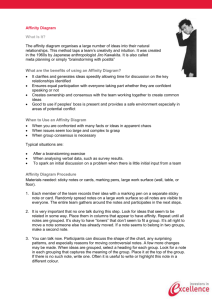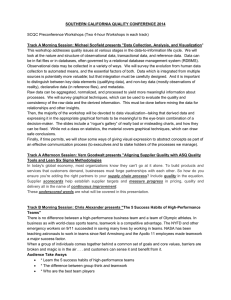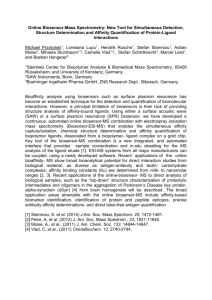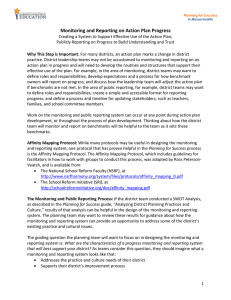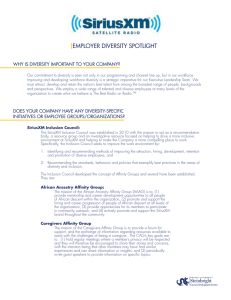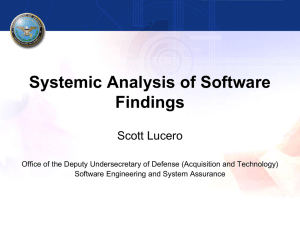risk management tips for lawyers
advertisement
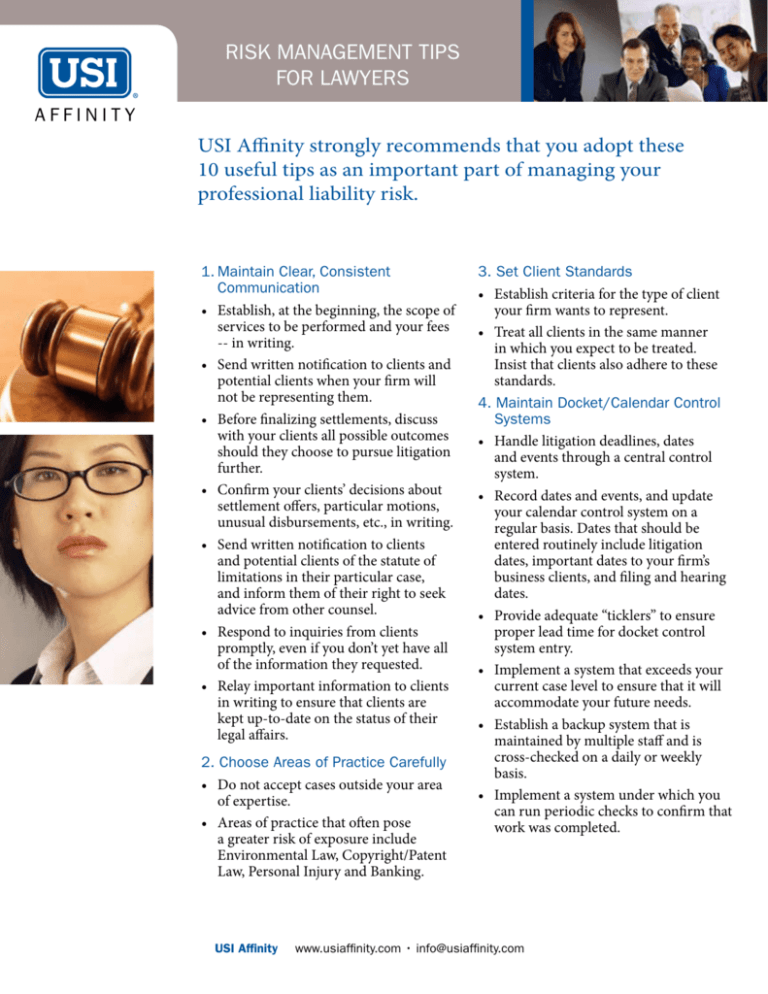
RISK MANAGEMENT TIPS FOR LAWYERS AFFINITY USI Affinity strongly recommends that you adopt these 10 useful tips as an important part of managing your professional liability risk. 1.Maintain Clear, Consistent Communication • Establish, at the beginning, the scope of services to be performed and your fees -- in writing. • Send written notification to clients and potential clients when your firm will not be representing them. • Before finalizing settlements, discuss with your clients all possible outcomes should they choose to pursue litigation further. • Confirm your clients’ decisions about settlement offers, particular motions, unusual disbursements, etc., in writing. • Send written notification to clients and potential clients of the statute of limitations in their particular case, and inform them of their right to seek advice from other counsel. • Respond to inquiries from clients promptly, even if you don’t yet have all of the information they requested. • Relay important information to clients in writing to ensure that clients are kept up-to-date on the status of their legal affairs. 2. Choose Areas of Practice Carefully • Do not accept cases outside your area of expertise. • Areas of practice that often pose a greater risk of exposure include Environmental Law, Copyright/Patent Law, Personal Injury and Banking. USI Affinity 3. Set Client Standards • Establish criteria for the type of client your firm wants to represent. • Treat all clients in the same manner in which you expect to be treated. Insist that clients also adhere to these standards. 4. Maintain Docket/Calendar Control Systems • Handle litigation deadlines, dates and events through a central control system. • Record dates and events, and update your calendar control system on a regular basis. Dates that should be entered routinely include litigation dates, important dates to your firm’s business clients, and filing and hearing dates. • Provide adequate “ticklers” to ensure proper lead time for docket control system entry. • Implement a system that exceeds your current case level to ensure that it will accommodate your future needs. • Establish a backup system that is maintained by multiple staff and is cross-checked on a daily or weekly basis. • Implement a system under which you can run periodic checks to confirm that work was completed. www.usiaffinity.com • info@usiaffinity.com RISK MANAGEMENT TIPS FOR LAWYERS AFFINITY 5. Document, Document, Document! • Keep accurate records in a proper filing system. • Document phone conversations, correspondence and meeting notes, and file them where they can be located easily. • Establish a follow-up and backup system, especially for computers. • Cross-reference clients to avoid conflict of interest. 7. Recognize Substance Abuse in the Workplace • Confront any attorneys and staff in your practice who suffer from drug and alcohol addiction or chronic abuse immediately -- early identification can lead to successful treatment. • Begin damage control immediately to diminish the chance of malpractice claims being filed. Many bar associations offer services that can be of assistance. 6.Use Engagement, Non-engagement and Disengagement letters • Establish the scope of services (including geographic scope) and representation as well as the communication and fee schedules, and the termination provisions. • Provide a written explanation of the agreement and your billing process. • Consider including a binding arbitration clause for disagreements over fees to prevent a cross-complaint alleging malpractice. • Make sure non-engagement letters (1) clearly state no relationship exists, (2) warn of limitations and/or statutes that require immediate action, and (3) direct the individual/corporation to obtain an opinion from separate counsel in a timely manner. • Use disengagement letters when withdrawing from a client matter to clearly communicate the terms of the withdrawal and time frame as well as to direct the client to seek other counsel. • Use disengagement letters when a client matter is included. (i.e., file close-out letter). 9. Avoid Filing Suits to Recover Legal Fees • Ascertain if the legal fee in question is worth the risk of a malpractice suit. • Establish a progressive billing cycle to discourage nonpayment. • Discuss all foreseeable costs with your clients prior to the engagement of services. USI Affinity 8. Participate in Continuing Legal Education • Attend continuing education seminars, and read advance sheets and other legal periodicals to stay up-to-date on changes in your profession. • Keep abreast of changes in the state and federal laws, and new techniques and court decisions. 10. Avoid Conflict of Interest • Avoid representing both sides in the same matter. • Avoid representing a client who potentially poses a conflict of interest with a current or former client. • Avoid holding an equity interest in a client’s business that may impair professional objectivity and affect your coverage. www.usiaffinity.com • info@usiaffinity.com

